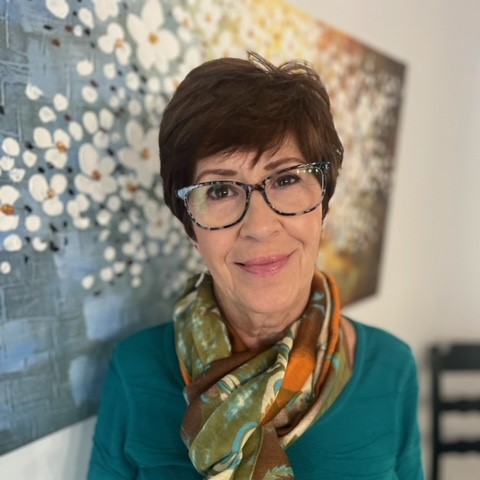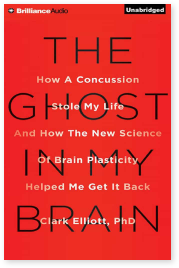Brain Injury Recovery: A Last-Ditch Effort for Hope
Utah resident Tamara Richardson, who resides near Salt Lake City, calls her first visit to the Mind-Eye Institute a “last-ditch effort” to quell the symptoms of her brain injury, regain some normalcy to her daily activities, perhaps even save her life.
Post-Concussion Syndrome: Daily Struggles After a Car Accident
As a result of a 2018 car crash – a pickup truck driver smashed into the back of her car while she was stopped at a traffic light, Tamara soon began developing light and sound sensitivities, severe nausea, vertigo that made walking difficult, convergence insufficiency, and “ten-plus migraines.” She also lost the ability to efficiently process signals from the world around her. She was unable to organize her thoughts and do the simplest of tasks – like cooking, laundry, and driving – or readily following location directions.
“I had been baking and cooking since age 15 and now I could not even manage the most basic of recipes. To do laundry, I depended on a neighbor to come over, carry my clothes down, and put them in the washer. I was unable to do the easiest of tasks like taking out the garbage. Cleaning became nearly impossible. Taking a shower was difficult. Hearing the running water, looking at the showerhead and standing in an enclosed space would make me dizzy.”
Brain injured in a car crash, Tamara could not return to her job, attend concerts and family events, or even go to church.
Sensory Overload and the Impact on Daily Life
Grocery shopping often proved most vexing and overwhelming for Tamara, causing her severe headaches and disorientation. “I had difficulty finding my way around familiar stores and could not figure out what I was looking for. The bright lights, carts and people moving around me, the music, sounds of cash registers, and those giant ceiling fans would instantly heighten my fear and anxiety and cause nausea. Sometimes I left shopping carts with groceries in an aisle, went home, and went to bed. When I did complete a grocery shopping trip with the help of store personnel, I was unable to take the groceries inside the house.”
Also frustrating was “my inability to communicate my thoughts effectively and cohesively, and I lost my capacity to read for extended periods of time and to retain, recall, and explain the details of what I had read.”
Because of the sensory overload in her brain, “I could no longer go to church or attend programs like concerts or even family events. I tried attending one of my grandchildren’s graduation ceremonies, but I had to leave in the middle of it because of severe nausea, headaches, and dizziness. The auditorium lights, people moving around me, the echoing of speakers’ voices – I could not take it anymore. I missed the family photos afterwards and the congratulatory celebration at a nearby restaurant.”
“I was contemplating suicide... I knew I could not live the rest of my life in this manner.”
- Tamara Richardson, Brain Injury Patient
She describes her then-situation as being “unable to do much of anything, and whatever I did caused me such fatigue I would have to go to bed.”
Yet, standard medical testing, including magnetic resonance imaging, had revealed nothing anatomically or neurologically unusual in her brain, Tamara says.
When the head injury first occurred, Tamara tried returning to work in medical billing. “But I realized I was unable to multi-task. Simultaneously answering phone calls, taking notes, and propagating the computer screen was just too much. I was making all types of mistakes; I could not return to my job.”
Even at home, in the early months following her trauma, “navigating room to room often confused me and caused fatigue,” she says.
By mid-2019, 13 months after the motor vehicle mishap, “I was contemplating suicide. I was on medication for depression and anxiety, and I knew I could not live the rest of my life in this manner,” says Tamara, who is in her sixties.
Discovering Dr. Zelinsky and the Mind-Eye Institute
Possible salvation came in the form of a friend, who, at the time, was a patient at the Mind-Eye Institute. From this friend, she learned about the book, Ghost in My Brain, authored and released in 2015 by Clark Elliott PhD., a professor at Chicago’s DePaul University. In the book, Dr. Elliott details his eight years of struggles following a brain injury and describes how Deborah Zelinsky OD, founder and executive research director at the Mind-Eye Institute in Northbrook, Ill., and Donalee Markus PhD, founder and president of Designs for Strong Minds in Highland Park, Ill., helped “reawaken my brain” and restore him to normal life.
Tamara told her husband, “The book has finally given me the words to explain how I have been feeling – what I could not describe earlier to my doctors. My husband and I also watched a few [videotaped] patient testimonials on the Mind-Eye web site. Finally, I said to him: ‘Mind-Eye may be my last hope. Let’s try it.’”
Mind-Eye Institute: All About Innovative Science
The Mind-Eye Institute is internationally known for its innovative neuroscience, namely the use of therapeutic eyeglasses, lenses, filters, and other advanced optometric tools to modify the amount, angle, and intensity of light passing through the retina. The retina plays a key role in the central nervous system.
Altering the way light enters the retina:
Creates changes in brain activity by often mitigating symptoms from traumatic head injury, concussion, stroke, or neurological disorders. These symptoms include visual processing disorders, headaches, brain fog, concentration and attention problems, sleep difficulties, even balance and mobility challenges.
Oftentimes proves effective in building undeveloped visual processing skills in children – and adults – with autism spectrum disorder, attention deficit hyperactivity disorder, and other learning difficulties.
Modifies some internal systems that regulate metabolism, motor control, posture, mood, circadian rhythm, and decision-making abilities, among other processes.
Supports the Mind-Eye Institute’s overall goal of using advanced optometric neuroscience to resynchronize a patient’s sensory inputs, especially the link between eyesight and hearing, thereby enhancing a patient’s quality of life and helping improve perception of his/her surrounding world.
Tamara remembers her first visit to the Mind-Eye in October 2019. “I was so nauseous that day and had extreme vertigo. I almost fell out of my chair. I needed assistance walking. And I gloriously failed every [Mind-Eye] test. I remember Dr. Zelinsky looking at me and saying, ‘You are a mess, but I can help you.’”
During the comprehensive Mind-Eye evaluation, Dr. Zelinsky put a pair of blue-tinted eye lenses on Tamara. “My breathing started to calm, and I began experiencing other beneficial physical changes. In fact, I jumped out of my chair, bent over, and stretched – something I could not do when I first arrived,” Tamara says. “I was able to stand straight up and walk out of the appointment without assistance. On the way home, I suddenly felt hungry. My husband and I stopped at a restaurant, and we were able to have a meal like that together for the first time in 14 months. The lights and noise in the restaurant did not seem to bother me either. Even the colors around me seemed more vibrant.
"One visit to the Mind-Eye Institute changed my life.”
- Tamara Richardson, Brain-Injury Patient
“One visit to Mind-Eye, and my life had suddenly changed – for the better,” Tamara adds.
Other people also noticed the change in Tamara. When she returned back home and went to the physical therapist who had been working with her following the car crash, “the therapist told me, ‘You don’t look like the same person.’” I responded that I had just gone to see Dr. Zelinsky at the Mind-Eye Institute and that I was already feeling much better.”
Tamara's Outlook: 90% of the Way Back
Tamara estimates her capabilities are now about 90 percent back to where they were prior to her brain injury. “Most of my symptoms are vastly reduced or gone, and I am driving again,” Tamara says, although she does retain some challenges with short-term memory loss, spatial mapping, word retrieval, headaches (that are significantly diminished), and dyslexia. “Dates, numbers, and time have caused me some embarrassing – and expensive – errors, especially when I try to book airline tickets for my upcoming Mind-Eye appointments.”
Besides calming her head injury symptoms, Tamara indicates Mind-Eye glasses seem to have eliminated her tinnitus (ringing in the ears), a condition she had prior to her car crash.
“Directions do remain a problem. In one instance, I was driving in rain or snow to my daughter’s house about 15 minutes away, and my car GPS system went out. I became completely lost and finally had to stop at a library, while crying hysterically. What should have been a 15-minute drive took me 45 minutes.” But Tamara believes her directional abilities will improve as her Mind-Eye glasses continue to change her brain.
"Most of my symptoms are vastly reduced or gone, and I am driving once again... I can now cook, bake, help take care of the home, and do a lot of other, every day, normal tasks.”
- Tamara Richardson, Brain-Injury Patient
On a positive note, “I can now cook, bake, help take care of the home, and do a lot of other, every day, normal tasks,” Tamara states. “Traveling still tires me, but if I have a brief rest after we arrive at our destination, I am OK. Unfortunately, other things I enjoyed doing with our grandchildren – water slides, rollercoasters, and theme-park rides – I can no longer do.”
Besides the therapeutic eyeglasses prescribed by Dr. Zelinsky and other members of the Mind-Eye team, including Carla Adams OD, Tamara says she has achieved improved cognition as a result of working the puzzles developed by Dr. Donalee Markus of Designs for Strong Minds.
“I cannot say enough about Dr. Zelinsky, Dr. Adams, and the other professionals who have brought me to where I am now. All things considered, Mind-Eye has returned me to a very good life,” Tamara says.
Although Tamara Richardson reports experiencing almost immediate symptom relief following a first visit to the Mind-Eye Institute, her experience is not necessarily the norm, nor is it guaranteed for every patient. Check out the Mind-Eye Institute at www.mindeye.com for additional information.
Interested in learning more?
At the Mind-Eye Institute we understand that interactions between the electrical and biochemical pathways in the brain affect physical, physiological and psychological systems. Visual interventions that alter retinal signaling pathways impact both the electrical and biochemical systems.
To learn about next steps for registering as a patient or registering a child as a patient, please call the Mind-Eye Institute office at 847.558.7817 or you can fill out our online New Patient Inquiry Form provided here.




